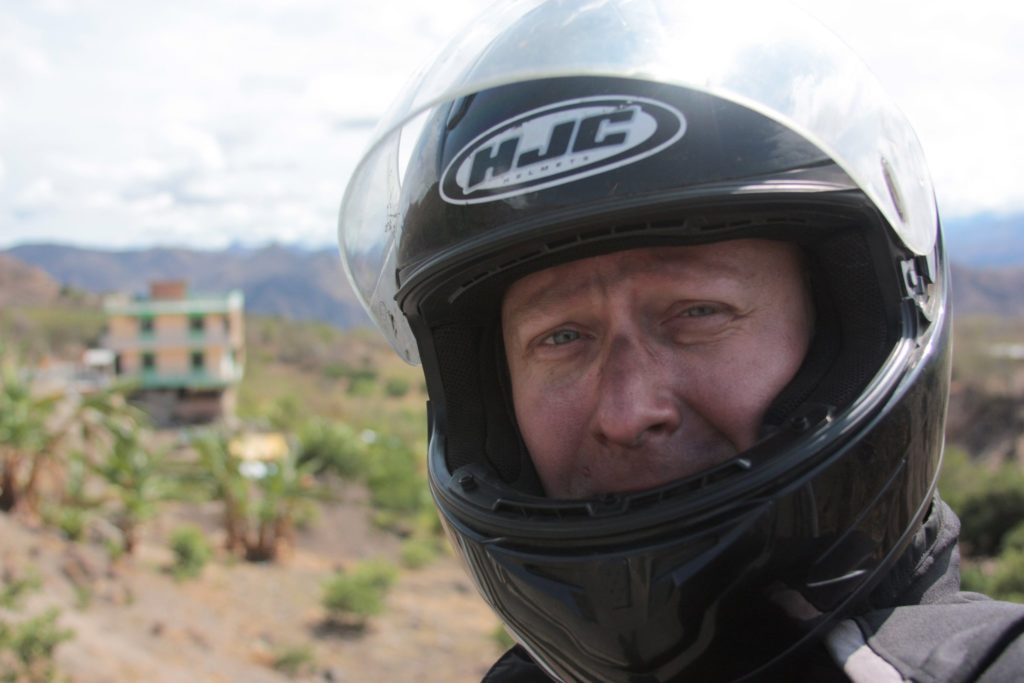
Martin Bauman hosted me on his podcast Story Untold to talk about the journey that led me to research and write a travel memoir about my Mennonite culture. Have a listen!


Martin Bauman hosted me on his podcast Story Untold to talk about the journey that led me to research and write a travel memoir about my Mennonite culture. Have a listen!
Join Cameron Dueck on Thursday, May 14 for a virtual launch of his new book, Menno Moto: A Journey Across the Americas in Search of My Mennonite Identity. There will be a reading, a Q&A, and the opportunity to win a copy of Menno Moto! Cameron will be joined by his brother, Rod, and writer Dora Dueck (no relation).
Join the event on Facebook Live
https://bit.ly/2SU8XNv
Thursday, May 14, 7pm EDT/6pm CDT
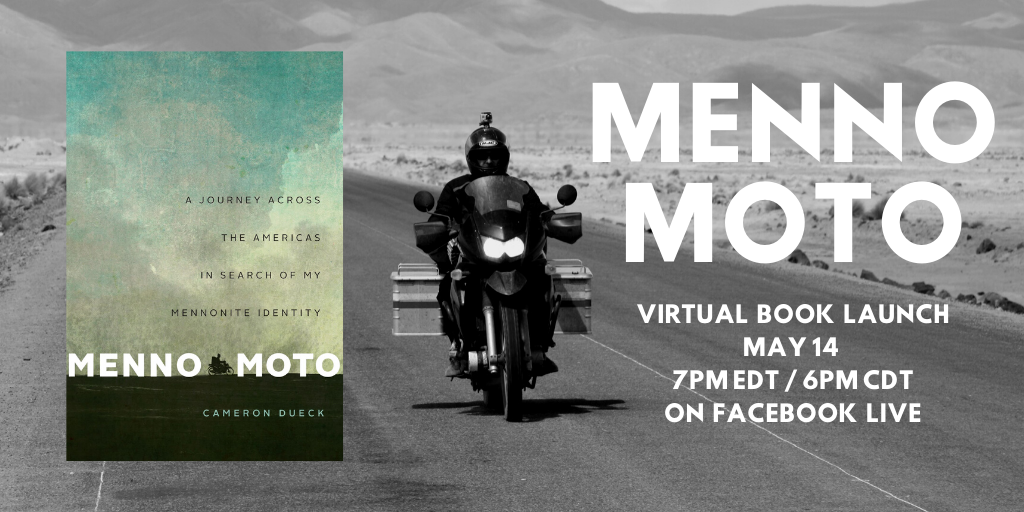
Across Latin America, from the plains of Mexico to the jungles of Paraguay, live a cloistered Germanic people. For nearly a century, they have kept their doors and their minds closed, separating their communities from a secular world they view as sinful.
The story of their search for religious and social independence began generations ago in Europe and led them, in the late 1800s, to Canada, where they enjoyed the freedoms they sought under the protection of a nascent government. Yet in the 1920s, when the country many still consider their motherland began to take shape as a nation and their separatism came under scrutiny, groups of Mennonites left for the promises of Latin America: unbroken land and new guarantees of freedom to create autonomous, ethnically pure colonies. There they live as if time stands still—an isolation with dark consequences.
In this memoir of an eight-month, 45,000 kilometre motorcycle journey across the Americas, Mennonite writer Cameron Dueck searches for common ground within his cultural diaspora. From skirmishes with secular neighbours over water rights in Mexico, to a mass-rape scandal in Bolivia, to the Green Hell of Paraguay and the wheat fields of Argentina, Dueck follows his ancestors south, finding reasons to both love and loathe his culture—and, in the process, finding himself.
To get your copy of Menno Moto, call or visit the McNally Robinson Grant Park bookstore. 10 AM to 6 PM, Monday through Saturday. 204-475-0483.
You may also order online here: mcnallyrobinson.com/9781771963473/cameron-dueck/menno-moto though note that it will take at least a week to process new orders, so for faster service we strongly encourage you to phone or visit the bookstore.
145 years ago today (Aug 1) my nine-year old great grandfather stepped off a paddle wheel ship onto the banks of the Red River in Southern Manitoba. He was among the first of 7,000 Mennonites to come to Manitoba from German-speaking colonies in South Russia, now Ukraine. His landing site was where I chose to begin my motorcycle adventure through the Americas. I crossed 19 countries and rode my bike 45,000 km to find the diaspora that has its roots in that same riverbank, and to discover the Mennonite in me. My book about that search for identity will be released by Biblioasis on March 21, 2020.

I’ve received many messages from people who want to know when they can read the story of my motorcycle trip across the Americas to research the Mennonite diaspora. Those messages encouraged me to keep editing, rewriting and reimagining what has become a very personal project. I’m pleased to finally have some good news to share. I’ve sold the manuscript to Biblioasis, and Menno Moto is slated for publication in Spring 2020.

Biblioasis is an independent bookstore and publishing company based in Windsor, Ontario. It was founded by Dan Wells as a bookstore in 1998, and in the early years it focused on poetry and short story collections. Biblioasis went on to become one of Canada’s most prestigious small press publishing houses and in 2015 they had three books nominated for the Giller Prize. You can read articles about them here and here.
Dan is known for taking a risk on new writers and books that other publishers won’t touch. In that case, I’m proud to have written something the publishing industry considers risky.
Menno Moto documents a culture of fair-haired, blue-eyed people who have created isolated colonies across Latin America. There, they have kept their doors and minds closed for nearly a century, viewing the rest of the world as sinful. These are my people, and they are my story.
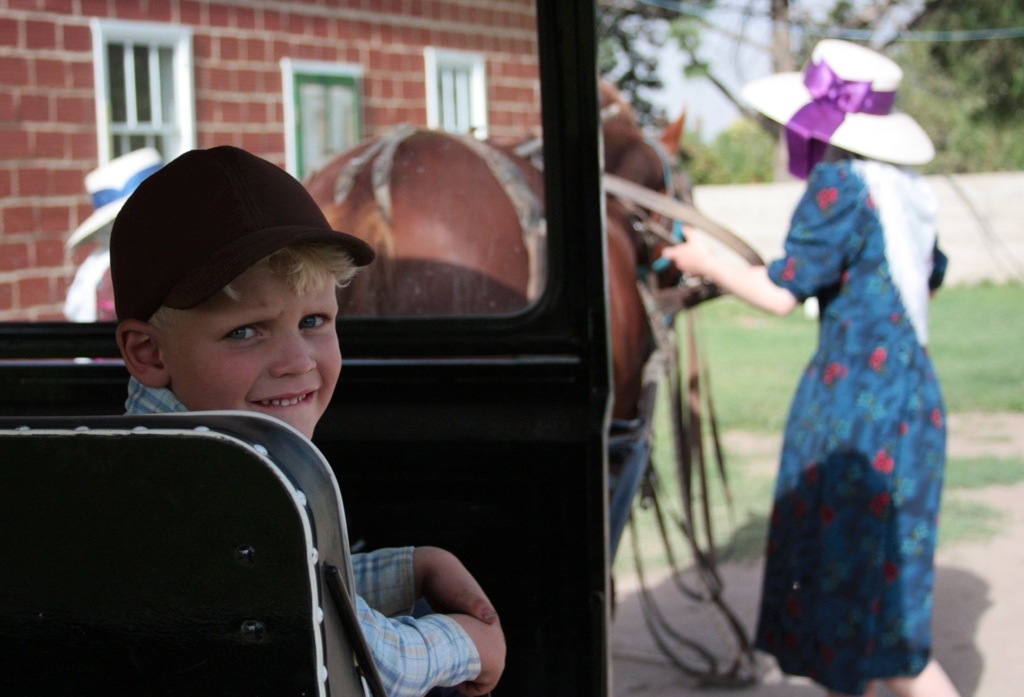
In Menno Moto, farmers, teachers, missionaries, drug-mules and rapists force me to reconsider my assumptions about my Mennonite culture, which I find to be more varied than I had dared to hope. I find some of my people in prison for the infamous Bolivian “ghost rapes”, while others are educating the poor in Belize or growing rich in Patagonia. In each of these communities I encounter hospitality and suspicion, backward and progressive attitudes, corruption and idealism. I find the freedom of the road, the hell of loneliness, and am almost killed by accidents and exhaustion as I ride my motorcycle across two continents. I learn that there is more Mennonite in me than I expected, and in some cases wanted, to find. I find reasons to both love and loathe the identity I am searching for.
I hope you’ll buy Menno Moto when it’s published in Spring 2020.

The Red Mill, the main building of the Vermont Studio Center, in the year’s first snowfall.
I’m at the Vermont Studio Center, in Johnson, VT for a month-long writing residency. The art center is based in repurposed turn-of-the-century buildings in the center of town — houses, church, grain mill, dance hall, gymnasium — all turned into studios, housing and dining hall. It’s a lovely place with about 50 residents in addition to a large community of staff artists and writers. I’m here to work on a series of essays.
Writing residents are given opportunities read their work to the community in regular readings held in the Lowe Lecture Hall, a wonderful old converted theatre. I chose to read from the manuscript of Menno Moto: A Journey in Search of Identity. It’s the first time I’ve read any of this work publicly, and I hope there will be many more readings once it gets published. You can listen to an audio recording of the reading here:
Audio Player
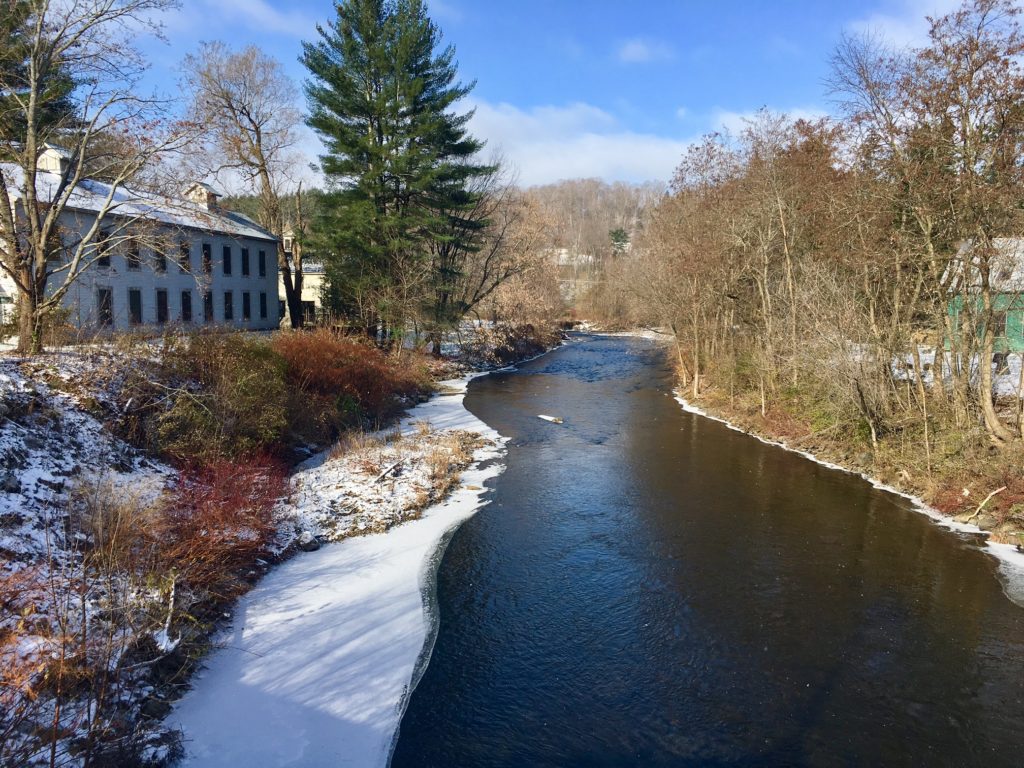
Maverick Studios, where I have been sat writing for the past month, on the banks of the Gihon River
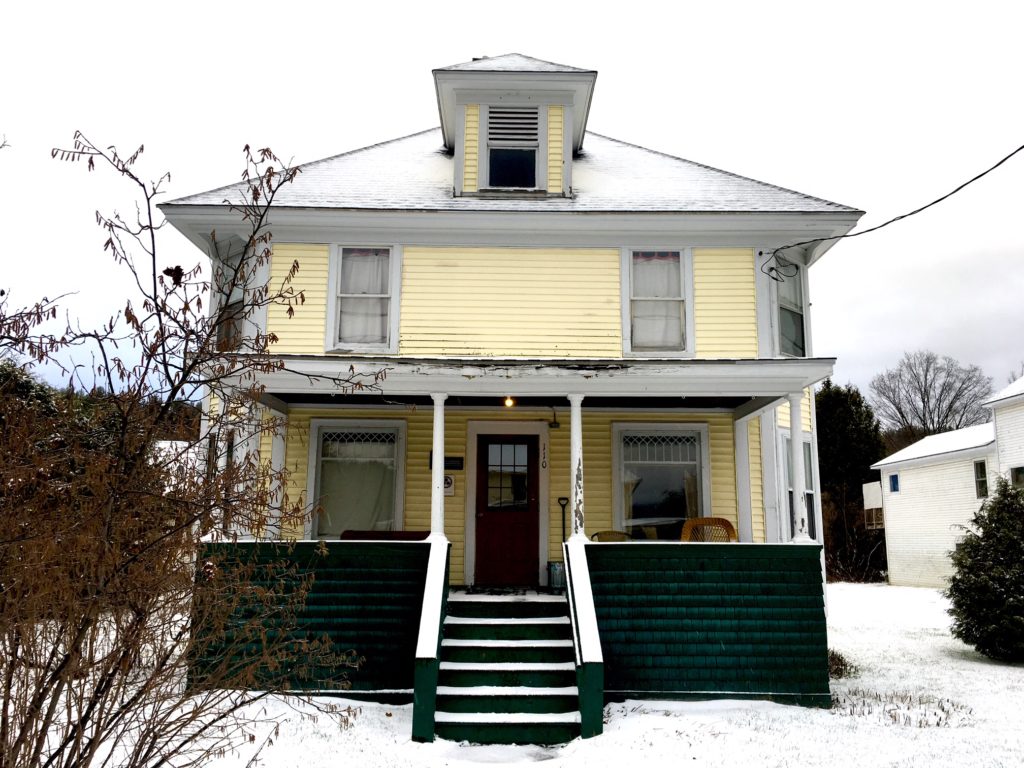
Bradley House, my home for the past month.
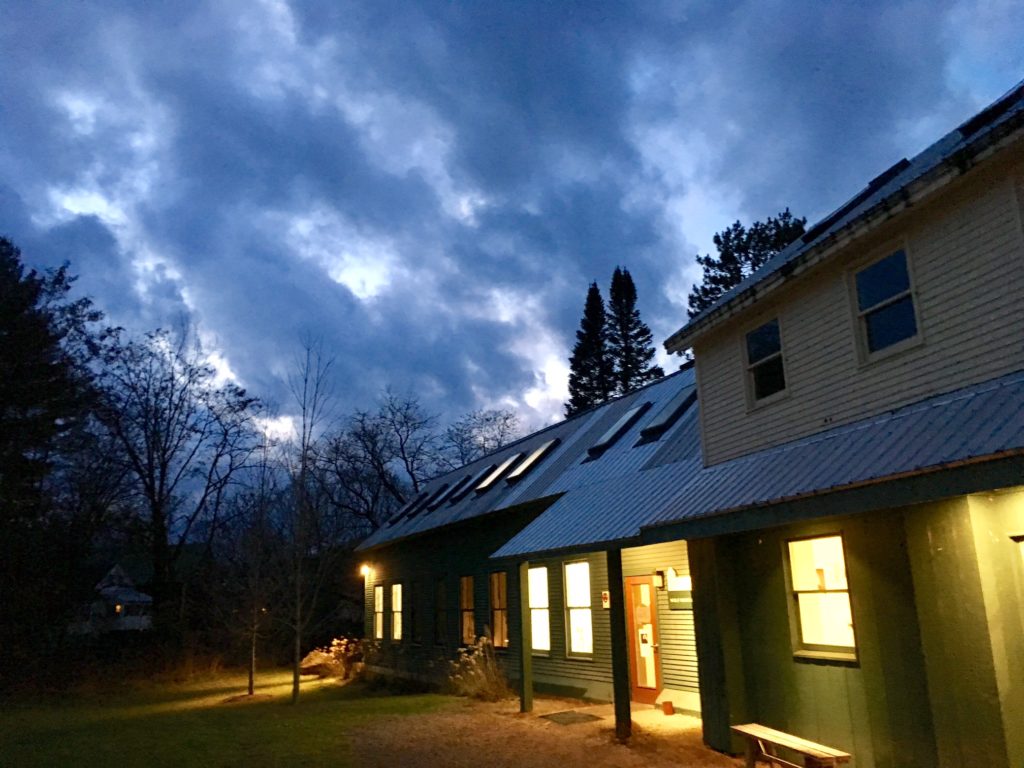
Wolf Kahn Studios, filled with incredibly talented visual artists.
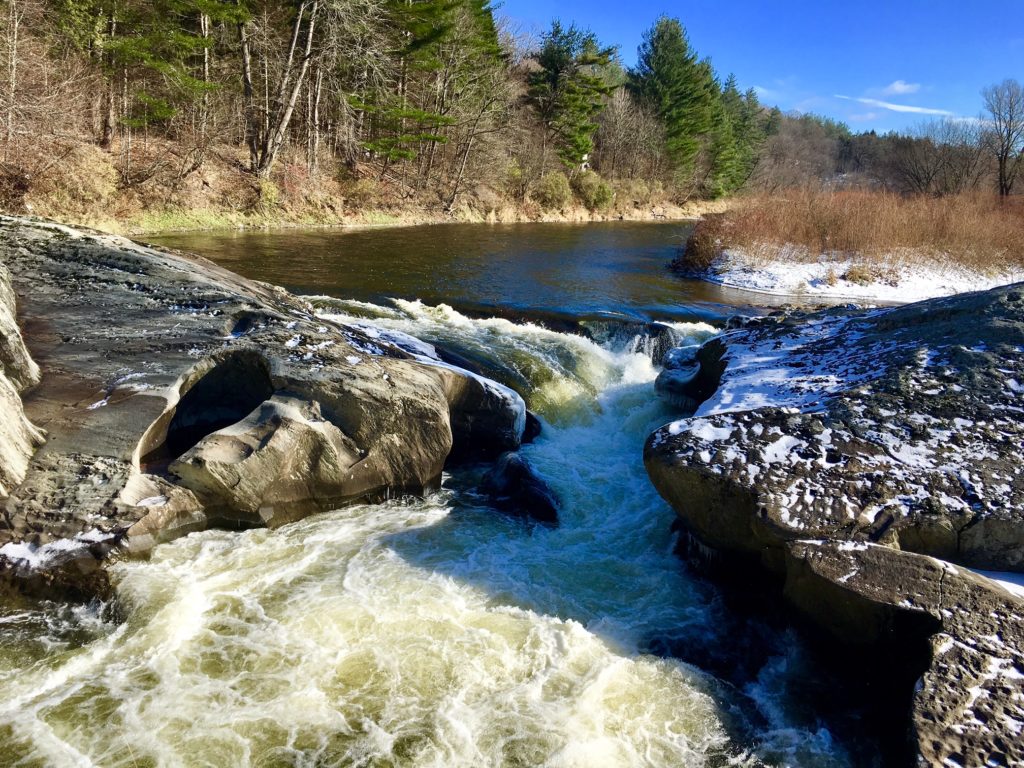
Dogshead Falls on the Gihon River
I’m at the airport in Santiago, Chile, about to fly to Winnipeg. Bike is sold, gear either tossed, given away, or jammed into my bags. I’m done and heading home! I set off for home with a rather empty bank account (budget? Oh, that! It’s busted, in a ditch somewhere in Colombia!) but I feel like the richest man alive with all I’ve seen and learned. Once again, I’ve been changed by a challenge, a journey, a goal achieved. I am incredibly lucky to be living the life I dreamt of as a child, and even luckier that you want to read about it.
Thank you for reading this blog over the past seven months. It’s been a pretty special journey. Not only have I see a good chunk of the world (19 countries!), but I have learned so much about my heritage and who we are as Mennonites. Now to fit that into a book!
Thank you to all those I’ve met along the way. The long-lost cousins, the Mennonites in far flung corners of the Americas, the bikers, the new friends made on ferries, dusty roads, in dodgy hostels, in splendid campgrounds. You, more than anything, made this journey worth the effort.
Many people have sent me notes in the past months. Encouragement, contacts, questions, challenges and advice. I’m sorry if I have not responded, but they were all deeply appreciated. Thank you!
Next up, seeing my first film, The New Northwest Passage, up on the silver screen at the Winnipeg Real to Reel Film Festival. It plays on Feb 16 and 17, I hope to see some of you there. Then, it’s back home to Hong Kong, where the real work begins…
Keep checking in for updates on the book, film, and my next adventure.
Slow down for curves,
pullover to help those in need.
But never stop,
because there’s even greater things ahead.
Cameron
I entered Brazil three days ago, though it feels like a week. This is the 16th country I’ve been in on this journey. The change from Paraguay was immediate and huge. Brazil is clean, pretty, green, civilized and wealthy. I like it, lots, although I am back to square one in terms of understanding what people are saying. Learning a bit of Spanish hasn’t done me a lick of good in understanding Portuguese.
I had my first major accident of the trip shortly after entering Brazil. A truck was stopped on the highway. A car in front of me blocked it from my view. The car swerved to avoid the truck at the last moment, leaving me with only meters of braking space. I was doing about 100km/hr and had only a split second to lock my brakes, so I estimate I was doing 70 km/hr on impact. My last thought was “This is gonna be a big crash”. But I got up immediately after everything stopped moving, and thought “Hmm, that wasn’t so bad.” I have not yet figured out the physics of it. The truck was pushed forward by the impact. This picture doesn’t show it well, but the truck bumper was torn clear off the frame. There was significant breakage/bending of the metal/frame. My bike suffered only some broke plastic on the fender and faring. The forks/wheel/handlebars are straight and true. I can’t figure out what absorbed all the force, and a witness on the scene was as puzzled as I was, as were the cops, EMS people, the driver of the truck, etc. I woke up VERY sore the next day, and I still am feeling like I was beaten with a lead pipe. But nothing was broken. Yes, I’m a lucky man. I have no collision insurance, so I had to pay the guy about $180. I could have just driven away (even the cop told me that) but that didn’t feel right, as technically it was my fault (although he was an idiot for parking on the highway like that). Life goes on.
A few bikers pulled up and helped me get my bike back on the road and negotiate the payment, etc. Thank you Volnei and Marcel!
I spent my first night in Brazil camped in a soya bean field. I look rather proud of myself.
The next morning I rode into Curitiba, Brazil. As I entered the city I passed a Kawi shop, so I stopped to say hello. They offered to give my bike a proper wash, and then they escorted me to a cheap, clean and cheerful hotel in the center of the city. Thank you Rhino Motorcycles.
Curitiba and the surrounding area is home to about 8,000 Mennonites, most of whom came from Russia/Ukraine/Siberia in the 1930s. This is Maria Duck (nee Kroeker), who fled Siberia at 5 years old, crossing the Amur River into Northern China and living in Harbin for about 1.5 years before finding her way to Brazil.
Witmarsum (named after Menno Simon’s birthplace) is the biggest colony. A lovely little village filled with intelligent, educated and open-minded Mennonites who have embraced Brazil as their home, at least the ones I met. Mennonites have a long and rocky history of resisting change, but in this case here I sensed a good balance of pragmatic acceptance of the onward march of time and continued pride in their Mennonite history.
Lena Harder is 83, and fled Siberia when she was 1 year old. She worked in the Witmarsum hospital for years, and now runs the museum that is housed in the same building. I asked her what she thought would become of Mennonite culture in her area. “Few kids these days can still speak Low German, they all speak Portuguese. But it will continue to exist here for a few more generations, I’m sure of that. It’s just part of life, we live in Brazil and we have to change and adapt to the culture around us,” she said.
I spent more than a week in Loma Plata, Paraguay. This colony was created by Mennonites who left Canada in the 1920s when the Canadian government said they had to start teaching their children English in school. They had a brutal first few years carving farms out of the “Green Hell” of the Chaco. Today it is a fairly open, forward thinking colony (with Spanish as the main language in school), though many of the stereotypes still hold true. They are still struggling to come to grips with being a part of Paraguay, rather than just having a mini-state within the country. It’s the biggest colony in Paraguay, and they have become very rich through farming and industry. They are descendants of families that came to Canada from Russia on the same ship my great Grandfather came on in 1874.
It was election time when I was there, and Andreas Neufeld is the outgoing president of the co-op, which runs just about every big business in town. It has annual revenues of $750 million. He has some interesting views on what Mennonites need to do to survive, many of which included more cooperation with the national government and better integration with Paraguayans. I agree.
These two dudes at Classic Moto helped me fix my leaking “chjiela” (radiator), put on a new tire and make other small repairs to the bike. Thank you Randy Fehr and Dorien Funk for the laughs, mechanical help and gallons of tereré you served me across this counter.
The old Explorers Club flag and I in front of the first Mennonite church in LatAm, in Loma Plata, Paraguay. I told the club the mission of this “flag expedition” was to get a sense of what modern Mennonite culture is. I think I’ve got a pretty good idea by now.
Helmut Neufeld and David Fehr spent a day showing me Menno Colony and a few historical spots in the area.
The next day I drove to Porto Casado with Rudy Harder (above), David Fehr and his brother Peter. This is where the Mennonites first arrived in the Chaco. We visited the cemetery, where the men found some of their relatives that didn’t survive the trip.
We ended the day by fishing in a Chaco pond. It was a lovely afternoon of fishing, eating, and telling stories. This is David Fehr.
Peter untangling his line…
This is just after Rudy put his trousers back on. He lost his line in the pond, so he had to strip down to his undies to retrieve it. I didn’t take any photos, but we gave him a pretty hard time for it. I think they had blue polka-dots on them.
A cookout over the fire, where David whipped up a giso (below). I’m told it’s an institution among Chaco ranchers, and I ate it several times while I was there. Very tasty.
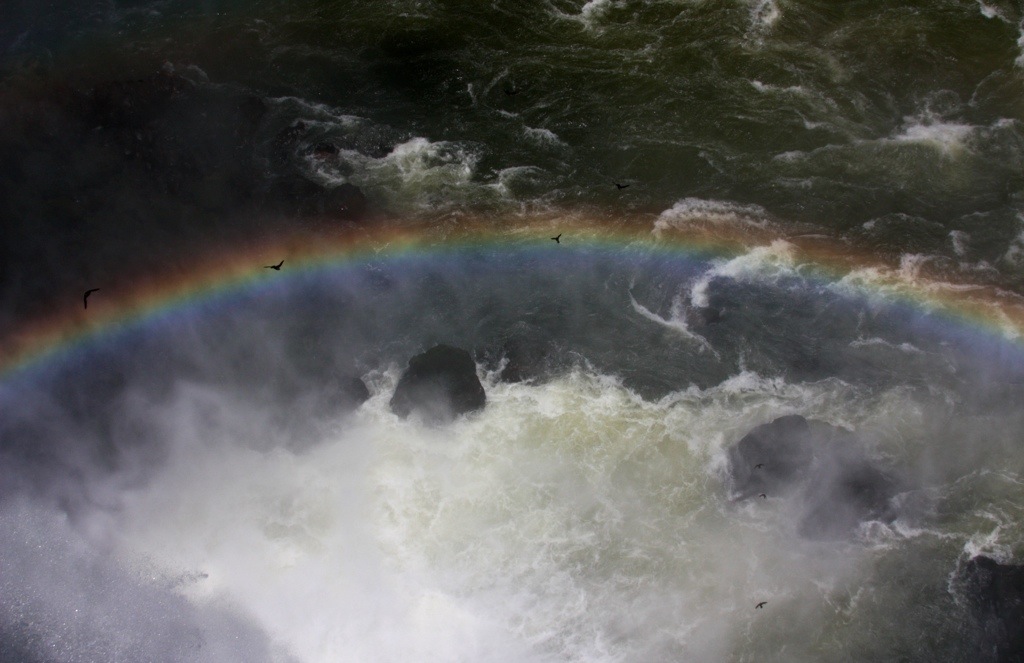
The first time I entered Brazil, in 2004, I did so illegally without a visa. I was caught and sent packing. I did it again on this trip, sneaking across the bridge from Paraguay to go see Iguazu Falls and then crossing properly the next day, since I only have a single-entry visa. And when I got to the falls…a rainbow!
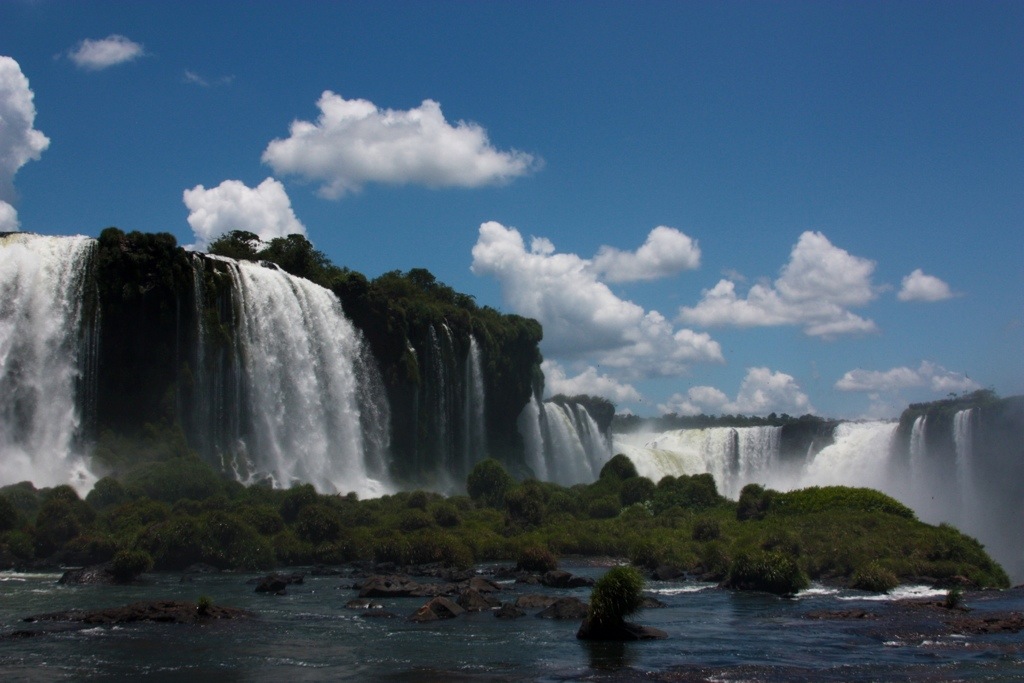
I’ve been in the Santa Cruz area of Bolivia for the past week. Bolivia has around 70,000 Mennonites, mostly Old Order, and most of them live within a few hours of Santa Cruz. I’ve met a great bunch of people at RTM Radio (a Christian radio network) who have taken me in, given me places to sleep, food to eat, people to meet, etc. They also put me on air, which has turned me into a minor (like D-list) celebrity in the area. I’m that Canadian guy on the motorbike. A big thanks to the Janzen, Friesen and Toews families.
Bolivia contains some of the most conservative Mennonites in the world. The majority of them do not have electricity, they drive tractors with steel wheels, have no cars/trucks, adhere to strict dress rules, have very limited education and struggle with Spanish (They speak German and Plautt Deutsche). Their remoteness and lack of education and civility has manifested itself in chronic problems with domestic abuse, incest, alcohol and drug abuse and conflicts with the Bolivian locals.
In 2009 a case came to light that has put the colonies, and particularly Manitoba Colony, into the international press and shed some light on how ignorant and vulnerable these people are. A group of men were accused of possessing a magic spray which could put whole households (and their dogs) to sleep, allowing the men to enter the house and rape the women unnoticed. A posse of vigilantes arrested these men, tortured them (one man died of his injuries) and eventually, by paying large sums of money to local authorities, had the men put in jail. This has become a modern Salem Witch Trial for the Mennonite community. No one knows the truth, who is guilty, if anyone is guilty, what happened, etc. But the men are in jail, and the story has only grown more lurid, complicated, unbelievable and sad over the years.
I have no illusion of finding the “truth” since it doesn’t really exist anymore. People don’t know the difference between what they have heard, dreamt, done, seen, imagined or wished. But I am meeting with many of the parties involved, as I think this story illustrates what can happen when you willfully keep a population ignorant, isolated and repressed.
This couple, Mr and Mrs Peters, told me the story of how their son was arrested, choked until he passed out and then hooked up to a 220v electric fencer until he confessed to raping women and having a can of the magic spray. The spray has never been found or proven to exist. They say he’s innocent.
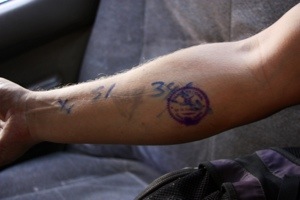 I went to the Palmasola prison to interview the men, who have never formally been convicted or sentenced. Palmasola is a “prison town” where children and families live with the convicted in a village like setting. It’s insane, overcrowded (more than 4,000 inmates), filthy but also colorful and quite “normal” in some ways. I kept thinking of Papillon when I was in the prison. I was not allowed to take my camera in, but I do have a picture of my arm to show you. I got stamped, numbered, checked and crossed by marker for every gate I passed through and bribe I paid.
I went to the Palmasola prison to interview the men, who have never formally been convicted or sentenced. Palmasola is a “prison town” where children and families live with the convicted in a village like setting. It’s insane, overcrowded (more than 4,000 inmates), filthy but also colorful and quite “normal” in some ways. I kept thinking of Papillon when I was in the prison. I was not allowed to take my camera in, but I do have a picture of my arm to show you. I got stamped, numbered, checked and crossed by marker for every gate I passed through and bribe I paid.
A quick update from Costa Rica…
We crossed the border from Nicaragua on Thursday, hoping to find a beach with Greenback Turtles arriving to lay their eggs. We drove down the coast, on the Nicoya Peninusula. We were told we’d find them at Playa de Ostional…however, the person didn’t tell us that it was down a 40km dirt track, nor that it would get dark and start raining cats and dogs before we got there. It was an exciting ride, off road riding in the rain in the dark with a heavily loaded bike, but all turned out well. And the next morning we got to see our turtles. Pretty amazing stuff. Spent several hours watching them come up the beach, dig their holes, lay eggs, and then crawl back into the sea. Lots of vultures, dogs and humans digging the eggs up to eat them…all part of nature I guess. I joined in when one of the Costa Rican Nico natives offered me a freshly laid egg, right there on the beach. They have permits to dig them. So I had to eat it…tasted like egg. Later, back at the guesthouse, the owner was cooking up eggs in his special broth, so I got to try cooked turtle eggs as well.
Yesterday I rode about 300km, nearly crossing the entire country. Thanks to the bikers I met at the petrol station on the Pan-American, it was fun to meet some local bikers, and get some local riding advice.
I’m now staying with the Mennonites in the San Carlos area of Costa Rica (thanks to those who sent me names, tips). I’m staying with the Clarence Dueck’s, and have already met their family here. It’s an interesting place, as it’s one of the rare cases when Swiss and Russian Mennonites have combined to create a community. The Russian Mennonites came here from Spanish Lookout about 35 years ago and got together with the Beachey Amish. It’s not an official colony, but there is a fairly large (15-20 families) community of Mennonites.
I’ll be here for a few days, and then off to Panama, where we’re hoping to join a weekend biker party. I’ll be spending at least a week in Panama to get visas, work on the bike, etc.